Did you know the time fresh vegetables spend in transport and storage may affect their vitamin content?
If you grow your own veggies, shop at farmers markets, or get a weekly CSA box, your veggies are truly fresh and still packed with vitamins.
However, if you buy veggies from a normal grocery store, the vegetables may be several weeks (or months) old by the time you eat them.(1,2)
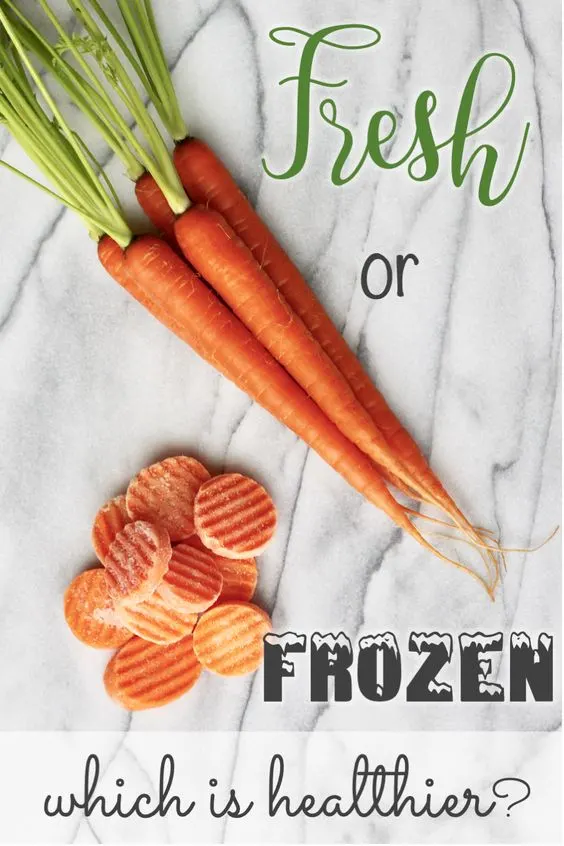
Frozen Vegetables vs Fresh
Time, temperature, light, and oxygen can affect the vitamin levels of vegetables after they are harvested.
To better understand whether fresh veggies have more nutrients than frozen vegetables, scientists at the Department of Food Science and Technology of UC Davis studied how storage conditions affect vegetable vitamin levels.(4)
The scientists measured vitamin levels in freshly picked vegetables stored either in the refrigerator or freezer.
The scientists evaluated six vegetables: peas, broccoli, carrots, spinach, green beans, and corn.
Specifically, the scientists measured levels of four antioxidant vitamins:
- Vitamin C (ascorbic acid, water-soluble)
- Riboflavin (vitamin B2, water-soluble)
- Vitamin E (α-tocopherol, fat-soluble)
- Vitamin A (β-carotene, fat-soluble)
How Well Do Frozen Vegetables Retain Vitamins?
After harvest, vegetables destined for the frozen food aisle are washed, blanched, and then quickly frozen.
Typically, veggies are frozen within a few hours of harvest, which is said to lock in nutrients.
The researchers at UC Davis replicated this process in the frozen veggies they studied. The vitamin levels in the six vegetables they evaluated are shown below.
Vitamin Retention in Fresh and Frozen Peas
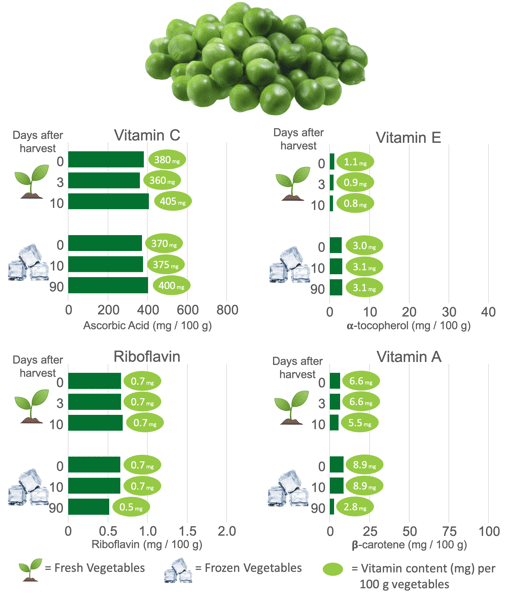
Peas are one of the first veggies we feed our children, and a main staple of the iconic frozen mixed vegetables.
Peas are a good source of Vitamin C. In fact, a 0.5 cup serving of peas provides almost 35% of the daily recommended value of Vitamin C.(5)
The scientists at UC Davis found that the amount of vitamin C in peas did not decrease during any storage condition.
However, riboflavin and β-carotene levels in peas did decrease during frozen storage, likely due to oxidative degradation.
Frozen peas had a 2-fold higher level of α-tocopherol, probably because of steam blanching.
Should you buy fresh or frozen peas?
You can be confident buying either fresh or frozen peas. In early spring, when fresh peas are available, you will get the maximum amount of vitamins from freshly picked peas.
However, in winter and other times of year when fresh peas are not available, frozen peas are a good source of many vitamins.
Just make sure you eat a variety of veggies to make-up for the slightly reduced levels of riboflavin and β-carotene.
Vitamin Retention in Fresh and Frozen Broccoli
Broccoli is a nutritional powerhouse.
Did you know that broccoli has about the same amount of Vitamin C as an orange? In fact, a 0.5 cup serving provides 85% of the daily recommended value of Vitamin C.(5)
Broccoli is also a good source of Vitamin E, Vitamin B2 and Vitamin K (not evaluated in this study).
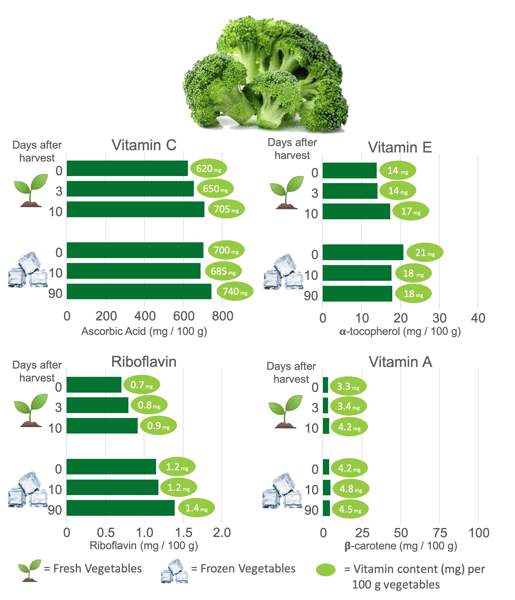
The scientists found no loss of vitamin levels during any of the frozen or fresh storage conditions.
Should you buy fresh or frozen broccoli?
Year round, frozen and fresh broccoli are a good choice. Both are excellent sources of vitamins and other phytonutrients.
Vitamin Retention in Fresh and Frozen Carrots
Whether steamed, roasted or served raw with a dip, carrots are a popular vegetable choice.
Carrots are a great source of β-Carotene, a metabolic precursor to vitamin A. In fact, a 0.5 cup serving of baby carrots provides 95% of the daily recommended value of Vitamin A.(5)
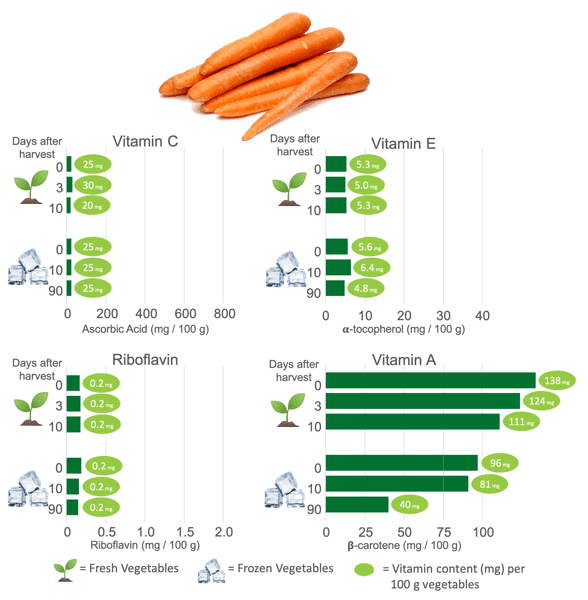
The researchers found that during the course of frozen storage, carrots lost more than 50% of their β-carotene content.
Fresh storage wasn’t great either. Fresh carrots lost at least 15% of their β-carotene during the 10-day refrigerated storage.
It is worth noting that the “fresh” carrots you are buying at the grocery store may be have been harvested months, not days, before you buy them.(6)
Those bagged carrots likely have significantly lower levels of β-carotene than those studied by the scientists at UC Davis.
Should you buy fresh or frozen carrots?
Carrots are an excellent source of β-carotene, the metabolic precursor to Vitamin A.
However, levels of β-carotene decrease during both frozen and fresh storage.
To maximize β-carotene from the fresh carrots you eat, buy carrots with the green leafy tops. The presence of the leafy tops reduces the shelf life of these carrot, making them the freshest option available at a grocery store.
Baby carrots are the next best option as they are more perishable than the large bags of carrots.
It is worth noting that β-carotene is an oil-soluble vitamin. So you need to eat it with some source of oil or fat to maximize its absorption. (Read more on why healthy salads need some fat.)
Vitamin Retention in Fresh and Frozen Spinach
Spinach is another nutrient dense vegetable. One cup of baby spinach provides 121% of the daily recommended value of Vitamin K (not evaluated in this study).(5)
Spinach is also a good source of vitamin C, vitamin E, and riboflavin.
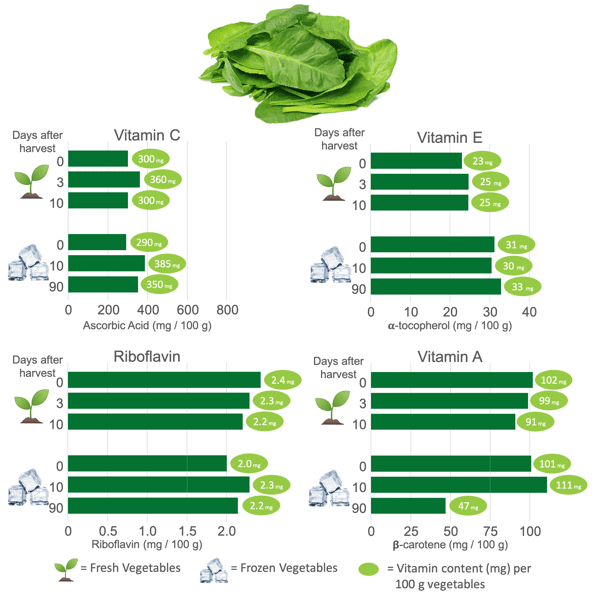
The UC Davis scientists found that with the exception of β-carotene, all vitamins evaluated in this study were retained during all storage conditions.
Should you buy fresh or frozen spinach?
Year round, either frozen or fresh spinach is a good choice as both are excellent sources of most vitamins and other phytonutrients.
If you are looking to to maximize your Vitamin A intake, consider eating salads made with baby spinach as fresh spinach looses less β-carotene than frozen spinach during storage.
Vitamin Retention in Fresh and Frozen Green Beans
Green beans are another popular vegetable that are found year round in many grocery stores.
Though they have lower vitamin levels than other green veggies like spinach and broccoli, green beans are a still a good source of vitamins and other nutrients.
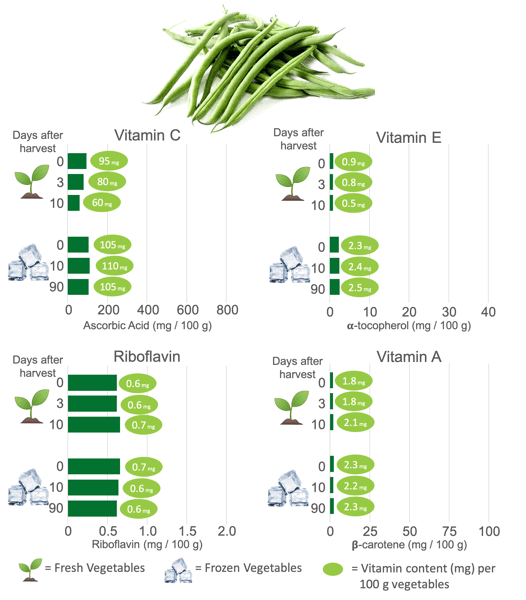
The scientists found no loss of vitamin levels was found for green beans during any of the frozen or fresh storage conditions.
Should you buy fresh or frozen green beans?
Year round, either frozen or fresh green beans are a good choice. None of the storage conditions studied showed a loss of vitamins.
Vitamin Retention in Fresh and Frozen Corn
Fresh sweet corn is one of the few vegetables that is hard to buy year round.
During the winter months, if you want sweet corn, your only option is frozen or canned. Corn has relatively low vitamin levels when compared with other nutrient dense veggies like spinach and broccoli.
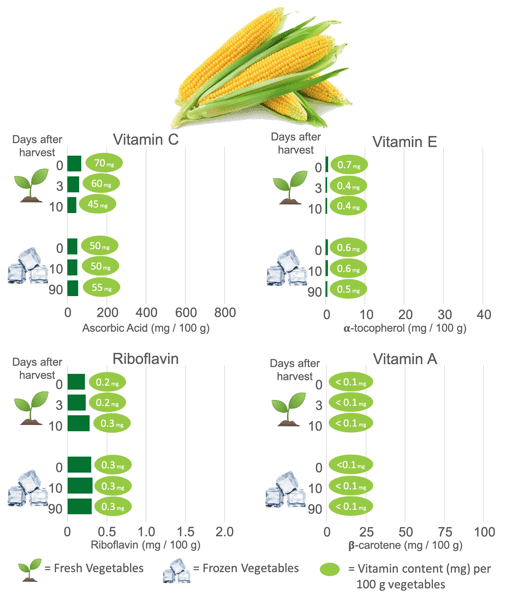
The UC Davis researchers found that while none of the corn samples had any measurable amount of β-carotene, the levels of all other vitamins stayed the same during the frozen and fresh storage conditions.
Should you buy fresh or frozen corn?
Vitamin levels in both frozen and fresh corn we maintained throughout both frozen and fresh storage conditions. So, buying frozen sweet corn is a good option when fresh corn on the cob is out of season.
Other reasons to buy frozen vegetables
1. Frozen Veggies are Picked at Peak Ripeness
Fresh vegetables are often picked before they fully ripen to prevent spoilage during shipping.
However, most frozen vegetables are harvested at peak ripeness and then flash frozen.
In the winter, when most vegetables are out of season, frozen vegetables are more flavorful than those grown and shipped from a different climate.
2. Frozen Veggies are Often Less Expensive
Frozen vegetables are often less expensive than fresh veggies, especially if you buy the value-priced store brand.
This is especially true for organic veggies.
Buying frozen organic vegetables is a great way to include organic vegetables in your meals while still maintaining your food budget.
3. Frozen Vegetables are Convenient
Frozen vegetables are pre-cleaned, pre-cut and often blanched. This is a huge time saver!
Steam or microwave your favorite frozen vegetables for a quick veggie side.
Thaw and add them directly to salads. Or oven roast them straight from frozen for a crisp and delicious veggie dish.
4. Less Food Waste
Have you ever found spoiled vegetables in your refrigerator crisper? Throwing out rotten veggies is a waste of money and food.
Buying frozen veggies means you can always have vegetables on hand without the need for careful inventory management.
However, this doesn’t mean you can leave frozen veggies in your freezer for months and years as some vitamins can degrade after extended time in the freezer.
Final thoughts on vegetables
Buy frozen vegetables that are 100% vegetables
Many seasoned frozen vegetables contain excess salt and sometimes even added sugar or preservatives.
Read the ingredients to ensure the frozen veggies you are buying are just vegetables.
Season the veggies to your taste after cooking them.
When you add salt table-side you almost always add less then during commercial food processing.
Buy organic vegetables whenever possible
Many conventionally grown vegetables consistently test positive for pesticide residues, including organophosphate pesticides.
To learn more, check out the Environmental Working Group’s list of top offenders (the Dirty Dozen list) and read more about pesticides and produce.
Many of the vitamins and nutrients in vegetables are oil soluble
To maximize your body’s intake of these nutrients, eat them with a fat or oil. Read more here on why you should include healthy sources of fat with your veggies.
Favorite recipes to make with frozen veggies:
Crispy Roasted Brussels Sprouts with Pistachio Sage Relish
Family Favorite Chili with Hidden Veggies
Rainbow Buddha Bowls with Crispy Tofu
Other veggie related topics:
5 Simple Ways to Eat More Veggies
Research-based tips to encourage your toddlers and young children to eat more veggies
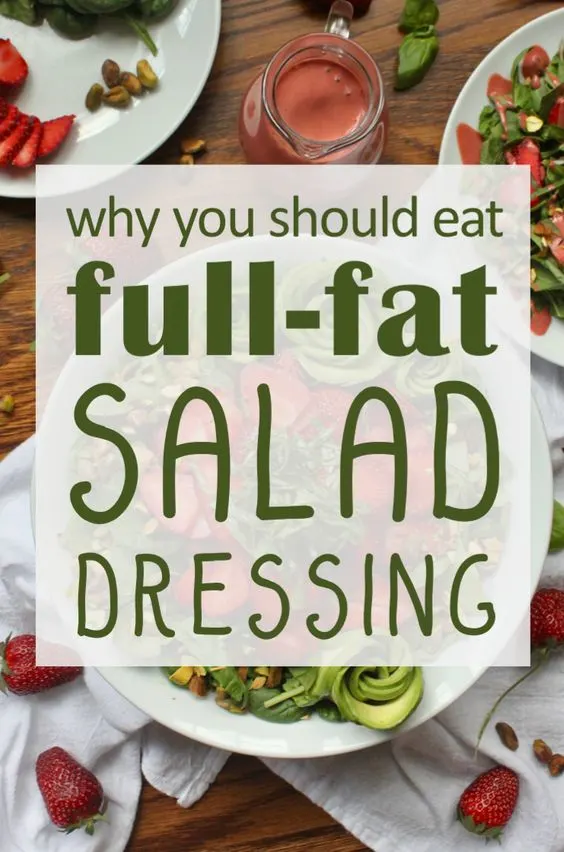
How eating salads and veggies with healthy oils helps maximize vitamin absorption
References:
- What We Eat, Marion Nestle, 2006 (link)
- Just how old are the ‘fresh’ fruits & vegetables we eat? The Guardian Website (link)
- Scientific Report of the 2015 Dietary Guidelines Advisory Committee. US Department of Health and Human Services. Washington, DC: US Government Printing Office; 2015. (link)
- Vitamin Retention in Eight Fruits and Vegetables: A comparison of Refrigerated and Frozen Storage. Journal of Agricultural and Food Chemistry, 2015, 63, 957-962 (link)
- Nutrition Information from Eat This Much Website (link)
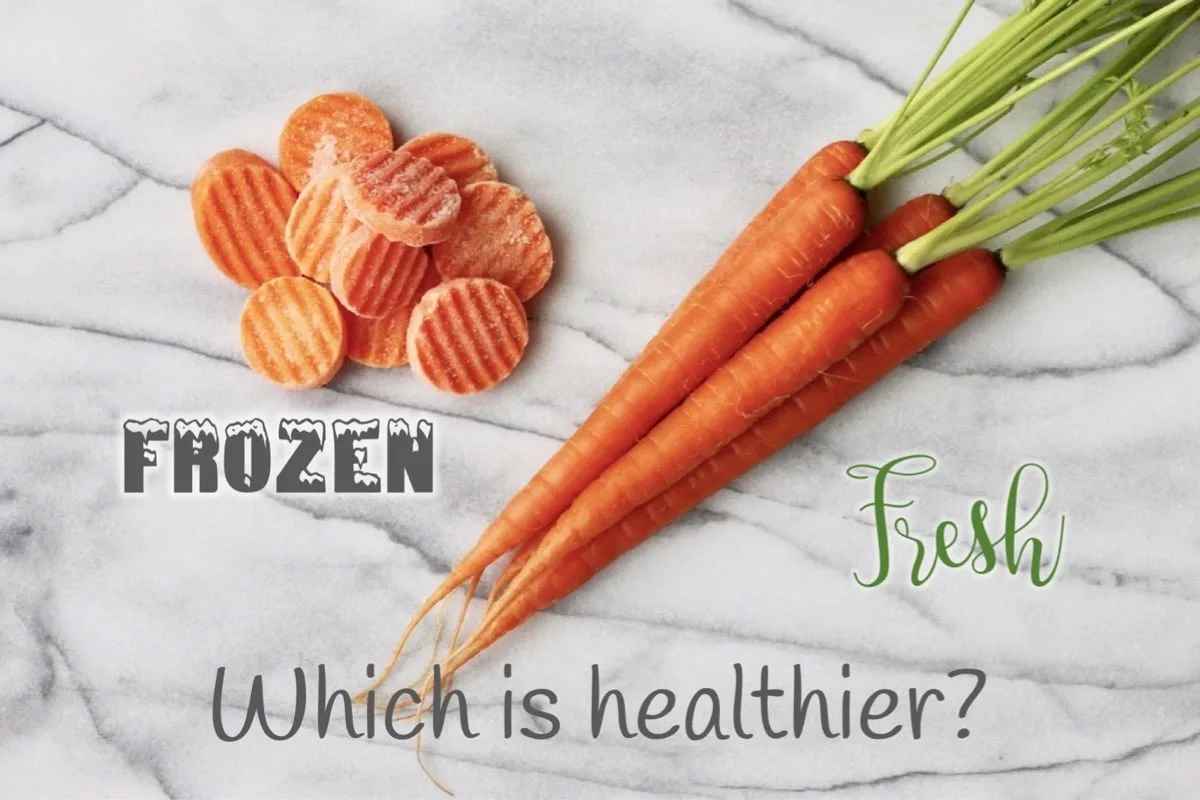
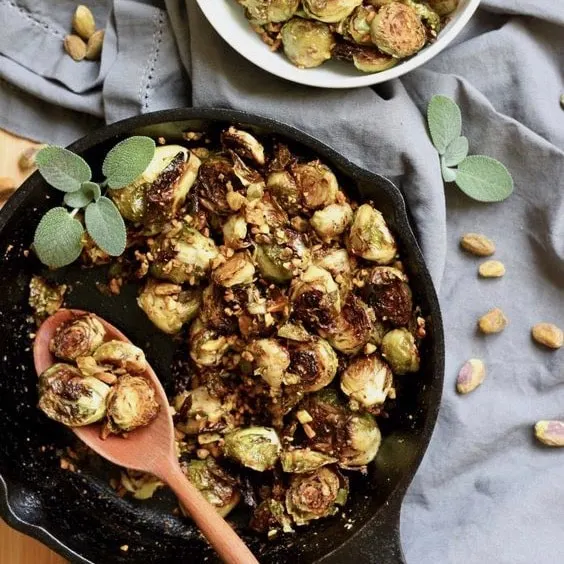

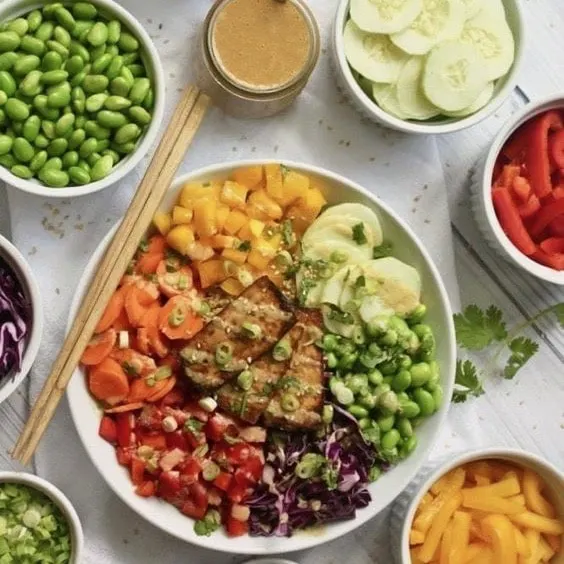
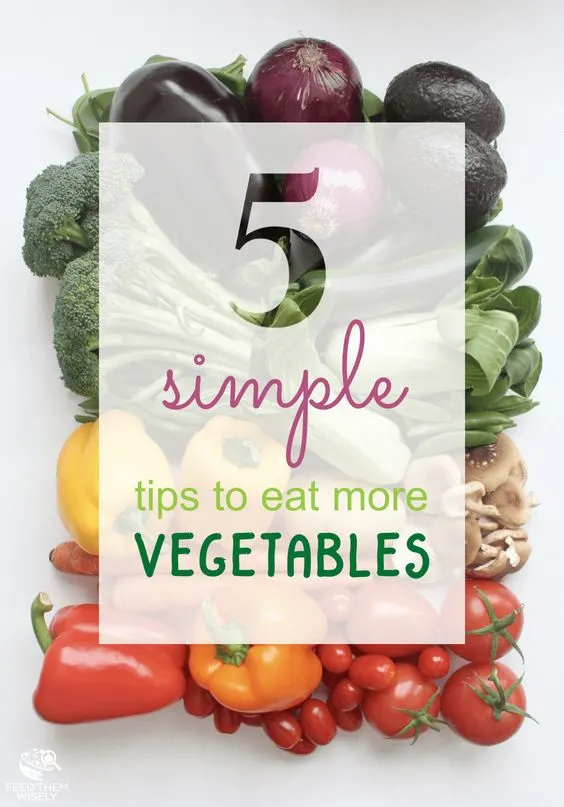
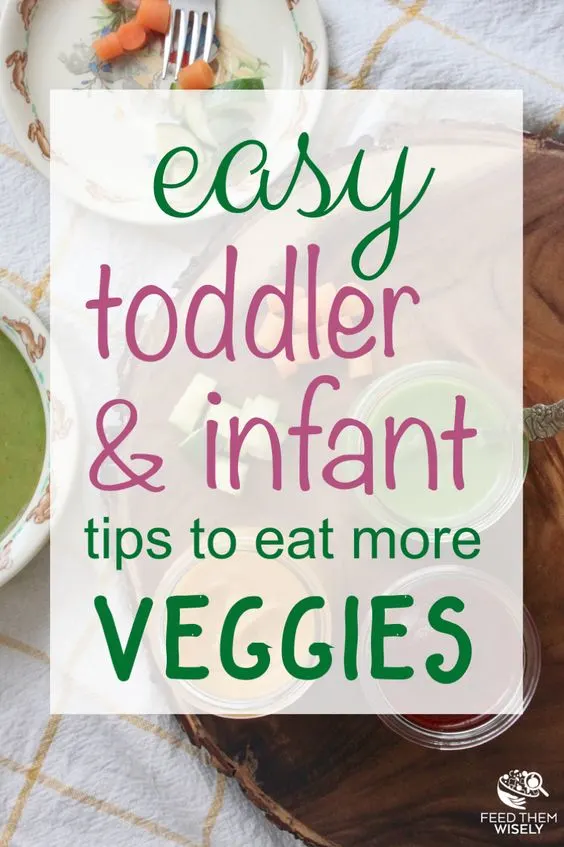
Laura Duffy
Wednesday 22nd of May 2019
Great article! It's really helpful to see the graphs comparing the nutrients in fresh and frozen. One question: you mention roasting veggies from frozen. I am dying to know how you do that! It has never been successful for me.
Renee D Kohley
Saturday 16th of March 2019
All so interesting -thank you for the break down on the different veggies. We use a lot of frozen during our long Michigan winters but thankfully have some fresh ones like the carrots.
Yang
Friday 15th of March 2019
Loved all the detailed information! I have even beard that frozen vegetables can be a better choice sometimes because they are picked at peak season. Now I know to factor in the slight loss of nutrients over time in frozen storage, after seeing the chart and all the comparison. Looks like β-carotene is one nutrient that really don't retain well. What's interesting is some nutrient increase over time. Wonder why or maybe it's just measurement error within normal range?
Meredith
Saturday 16th of March 2019
Hi Yang! This is a great question. The researchers hypothesized that the increase in some vitamins during the frozen storage was from the blanching the vegetables before freezing them. They presumed that this made some vitamins easier to extract from some vegetables. You are also right that there was some variability in the measurement, which is normal.
Anne Lawton
Friday 15th of March 2019
I have always heard that there is little difference between fresh and frozen vegetables. Thanks for sharing your findings on this. I always have a stash of frozen veggies in my freezer
STACEY CRAWFORD
Friday 15th of March 2019
Such great information! I like fresh best but frozen is very convenient to have for soups or stews. I do prefer frozen to canned veggies, though.